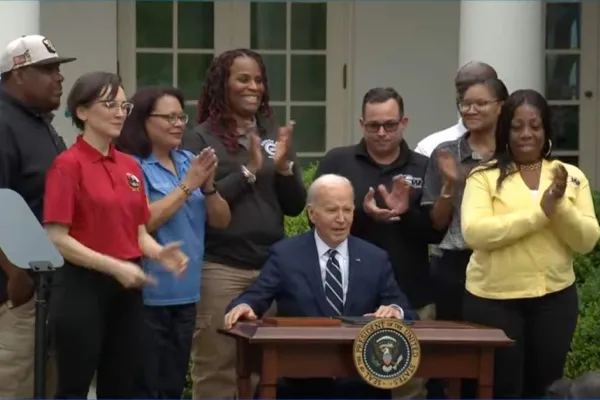Supreme Court to ponder union rights for national guard techs
The US Supreme Court will hear oral argument over whether to strip federal-sector labor law rights from the National Guard’s dual-status technicians, a unique type of federal employee who works for state militias.
The justices on Monday will review a federal appeals court decision blessing the Federal Labor Relations Authority’s jurisdiction over a dispute stemming from the Ohio National Guard’s attempt to oust an American Federation of Government Employees affiliate that represents Guard technicians.
The high court is hearing Ohio’s bid to evade federal oversight—an obstacle to ejecting the AFGE affiliate—despite agreement among all six federal appeals courts that have ruled on the issue.
More than 32,000 technicians are represented by unions, in every state but Mississippi, according to the FLRA. The technicians’ collective bargaining rights flow from their hybrid designation as both members of the state militia and federal civilian employees. States are not required to bring them on, and the federal government pays their salaries.
The case stems from the Ohio National Guard’s 2016 campaign to unilaterally end its nearly 50-year-old collective bargaining relationship with the AFGE affiliate representing technicians.
The FLRA ruled that the Ohio National Guard illegally failed to bargain with the union, ended the automatic withdrawal of members’ dues payments, and announced it’s not bound by federal-sector labor law or its collective bargaining agreement with the union. That ruling drew Ohio’s court challenge to the agency’s authority.
In a 2021 decision handed down by a judicial panel of three Clinton appointees, the US Court of Appeals for the Sixth Circuit held that the FLRA has jurisdiction over the Guard because it’s a federal executive agency when it acts as an employer of the technicians. That ruling followed similar findings from the Second, Seventh, Eight, Ninth, and D.C. circuit courts.
What Makes an ‘Agency’?
Ohio argues its National Guard, the Guard’s commander—called an “adjutant general"— and the commander’s office aren’t covered by the federal-sector labor law empowering the FLRA to issue orders to a “labor organization” or an “Executive agency.”
“Federal law, it is true, regulates adjutants general and state national guards,” Ohio said in a brief, noting that a statute requires states to have adjutants general. “But the federal government’s regulation of state officers does not turn those officers into federal officers, let alone federal agencies.”
The FLRA argues federal-sector labor law applies to entities like the Ohio National Guard that employ and supervise covered federal workers, even when they fall outside of the law’s definition of an “agency.”
“They are not required to employ dual status technicians at all,” the FLRA said in a brief. “But if they choose to do so, they assume a distinct federal role and act on behalf of a covered agency because Congress has expressly authorized them to ‘employ and administer’ a unique class of federal civilian employees on DOD’s behalf.”
The AFGE affiliate made similar arguments in its brief, saying the Guard effectively takes on the status of an “agency” by choosing to employ technicians.
The Ohio Attorney General’s Office and AFGE declined to comment. The US Justice Department didn’t respond to a request for comment.
Federalism and State Militias
Several Republican-led states have backed Ohio’s bid to evade FLRA oversight of its labor relations with its Guard technicians. The Sixth Circuit ruling further erodes the Constitution’s design for the military, with the federal government controlling the nation’s army and states’ authority over their own militias, the states said.
“That design recognizes that, to provide security, the national government needs the preeminent role in national defense, but that so empowering the national government risks tyranny—and the States need powers to preserve liberty,” Mississippi and 10 other states said in an amicus brief.
But a group of military law scholars said the view that the Constitution gives states principal authority over militias and that federal laws should be interpreted narrowly or struck down is “both wrong and dangerous.” Ohio and the other states advocate for an approach that would spark a “radical change” to the National Guard’s place as a essential part of the US military, they said.
“That result,” the scholars said in their amicus brief, “would greatly undermine the nation’s ability to respond to international and domestic threats.”
The case is The Ohio Adjutant Gen.'s Dep’t v. Fed. Labor Rels. Auth., U.S., No. 21-1454, oral argument 1/9/23.
To contact the reporter on this story: Robert Iafolla in Washington at riafolla@bloomberglaw.com
To contact the editor responsible for this story: Genevieve Douglas at gdouglas@bloomberglaw.com; Rebekah Mintzer at rmintzer@bloombergindustry.com
Biden Administration Investments Bring CWA-Represented Jobs to Georgia


